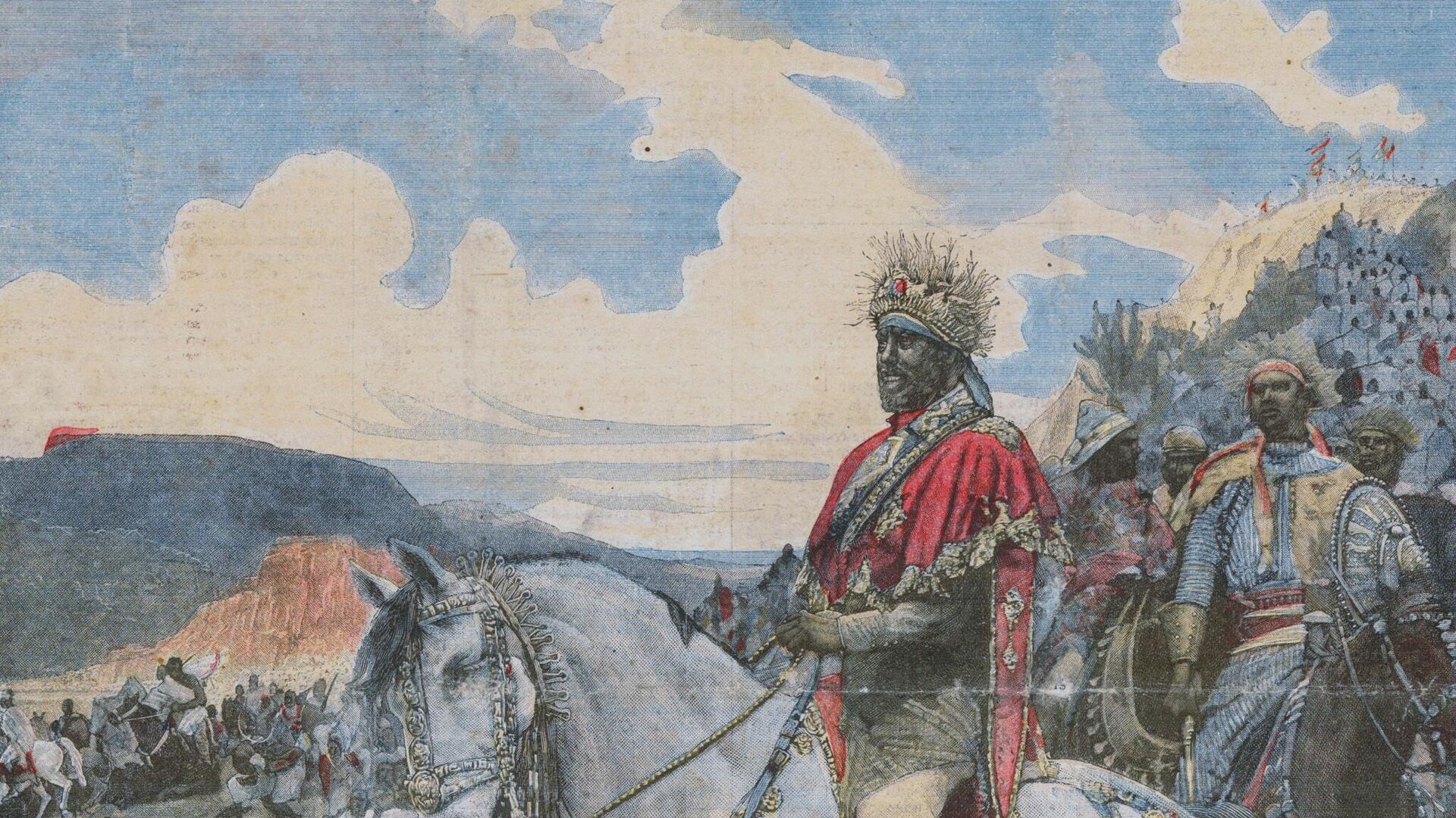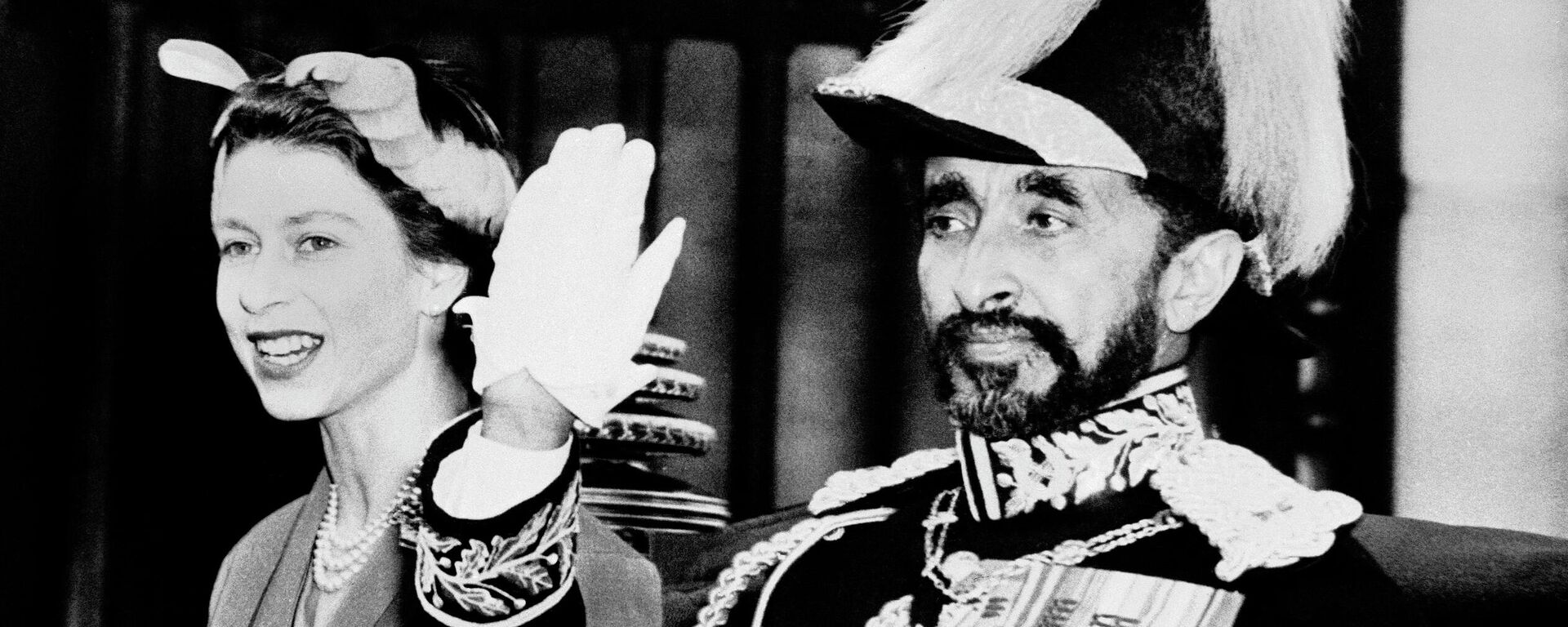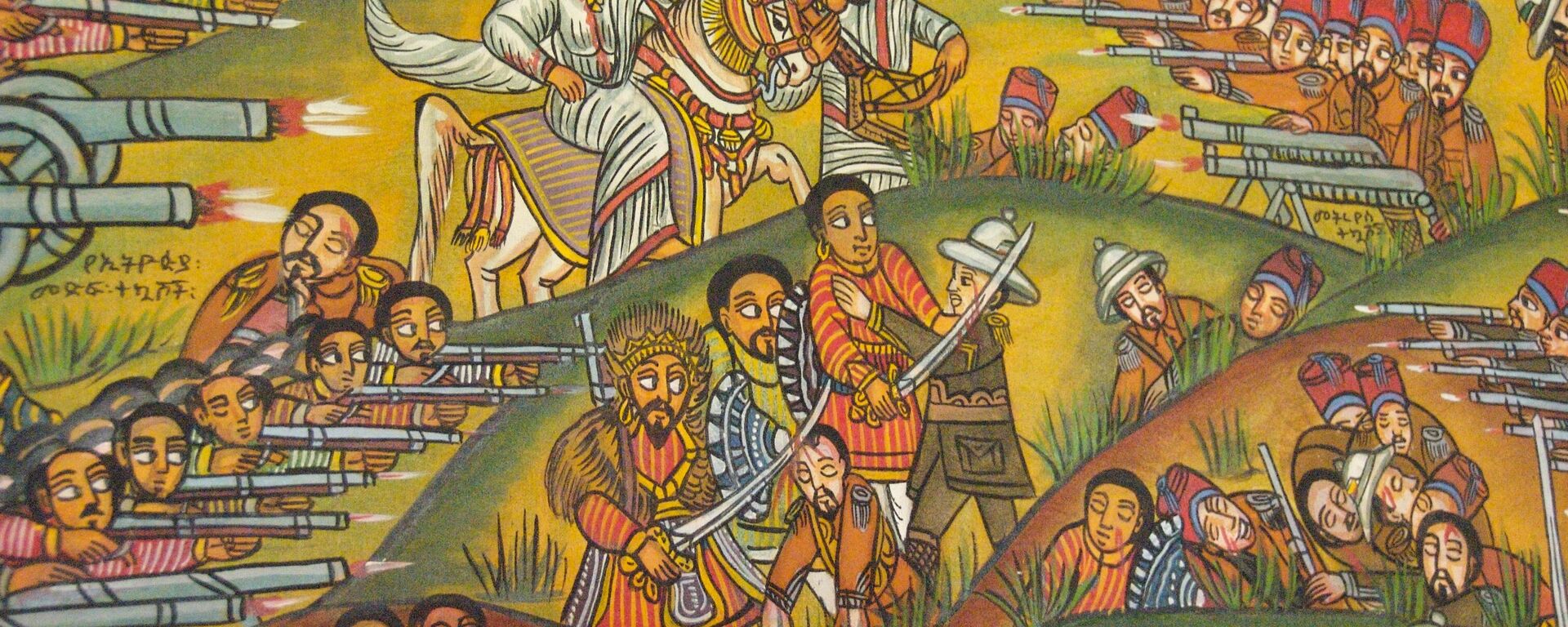https://en.sputniknews.africa/20231212/menelik-ii-ethiopian-emperor-who-resisted-colonialism--modernized-his-nation-1064079639.html
Menelik II: Ethiopian Emperor Who Resisted Colonialism & Modernized His Nation
Menelik II: Ethiopian Emperor Who Resisted Colonialism & Modernized His Nation
Sputnik Africa
Today marks the 110th anniversary of the death of Menelik II, one of Ethiopia’s greatest rulers, who expanded the empire, repelled an Italian invasion, and... 12.12.2023, Sputnik Africa
2023-12-12T14:35+0100
2023-12-12T14:35+0100
2024-04-25T10:22+0200
sub-saharan africa
ethiopia
anniversary
ethiopian empire
italy
east africa
colonialism
development
history
https://cdn1.img.sputniknews.africa/img/07e7/0c/0c/1064081453_0:10:2047:1161_1920x0_80_0_0_37d0b08ce691e5559bdcc6b78c86dd21.jpg
Menelik II was born in 1844 as Sahle Maryam, the son of the king of Shewa, a semi-independent kingdom in central Ethiopia. Captured by Emperor Tewodros II in 1855 during the invasion of Shewa, he was taken to his mountain fortress. There, he married the emperor’s daughter, Altash Tewodros, and received a traditional church education.In 1865, he escaped from the fortress with the help of his allies, returning to Shewa to claim the throne. He consolidated his power by expanding his domain and allying with other regional rulers. He also acquired modern weapons and trained his army with the help of foreign instructors, including those from the Russian Empire.In 1889, he became the emperor of Ethiopia following the death of Emperor Yohannes IV, who was killed in a battle against the Mahdists of Sudan. He Inherited a country threatened by European colonial ambitions, especially by Italy, which had occupied the coastal regions of Eritrea and Somalia.Menelik II was the last ruler of Ethiopia who could claim a direct uninterrupted male descent from the Solomonic dynasty, which, according to a legend, was founded in the 10th century BC by Menelik I – a son of the biblical King Solomon and Queen Sheba.Modernizing EthiopiaMenelik II was a visionary leader who aimed to modernize Ethiopia and preserve its independence. He initiated a series of reforms that reshaped the country’s political, economic, social, and cultural aspects.Some of his notable achievements include introducing the first modern coinage, establishing a postal service, and implementing a railway system in Ethiopia. In 1892, he built the capital city of Addis Ababa, meaning "new flower" in Amharic, and relocated his seat of government there.Menelik II also established the first cabinet of ministers to assist in the administration of the empire, appointing trusted and widely respected nobles and retainers as the initial ministries. He created a national bank, a supreme court, and a council of state.Apart from that, the emperor patronized arts and culture, commissioning the construction of many churches, palaces, and monuments, and supporting the development of literature, music, and painting. Menelik II advocated for Amharic as the official language of the empire, and promoted the study of Ethiopian history and culture.Expanding the empire to nearly its present-day borders, Menelik II incorporated diverse peoples and regions into his realm. He also established diplomatic relations with various European powers, the Russian Empire and the United States, and sent emissaries and students abroad to learn from other civilizations.Resisting Colonialism & the Battle of AdwaMenelik II’s most renowned achievement was his victory over the Italians at the Battle of Adwa on March 1, 1896. This was the climax of a long-standing dispute between the two countries over the interpretation of the Treaty of Wuchale, signed in 1889. The treaty granted Italy a protectorate over Ethiopia, but Menelik II rejected this clause and declared the treaty null and void.Seeking to expand their colonial empire in Africa, the Italians invaded Ethiopia from their base in Eritrea. Menelik II mobilized a large army of about 100,000 soldiers, drawn from various regions and ethnic groups of his empire. He also received support from the last Russian Emperor, Nicholas II, who supplied his African ally with weapons and military advisers.The two armies clashed in the mountainous terrain of Adwa, where Menelik II’s forces outnumbered and outmaneuvered the Italians. The battle lasted for about six hours, resulting in a defeat for the Italians, who lost about 7,000 men killed and 1,500 captured, while the Ethiopians lost about 4,000 men killed and 8,000 wounded.The Battle of Adwa stands as a historic event that halted Italy's ambitions to establish an empire in Africa. It secured Ethiopia's sovereignty, distinguishing it as one of only two African nations (alongside Liberia) that had never been colonized by Europeans. Adwa was also the first crushing defeat of a European power by African forces during the colonial era, and inspired other African nations to resist foreign domination.Death & LegacyMenelik II was a remarkable figure in African history who left a lasting legacy for his people and the world. He passed away from a stroke on December 12, 1913, at the age of 69. Acknowledged as one of Ethiopia's greatest rulers, the emperor was succeeded by his daughter, Zewditu, who became Ethiopia's first female empress.Today, Menelik II is revered as a national hero and a symbol of Ethiopian pride and identity. His achievements and the modernization of Ethiopia are celebrated and commemorated in various ways, such as statues, monuments, streets, schools, and institutions that bear his name.Another important site that commemorates Menelik II is his mausoleum, located within the church of Kiddist Maryam in the palace compound of Addis Ababa. The mausoleum contains the tombs of Menelik II, his wife Empress Taitu, and his daughter Empress Zewditu. The church also features a large imperial crown at the top of the dome, and displays many paintings depicting important events in Ethiopian history.Menelik II's victory at the Battle of Adwa is also remembered as a source of inspiration and empowerment for Africans and people of African descent worldwide.
https://en.sputniknews.africa/20230723/haile-selassies-131st-birthday-how-does-world-remember-ethiopias-last-emperor-1060712947.html
https://en.sputniknews.africa/20230301/1058543704.html
ethiopia
ethiopian empire
italy
east africa
Sputnik Africa
feedback@sputniknews.com
+74956456601
MIA „Rossiya Segodnya“
2023
Muhammad Nooh Osman
https://cdn1.img.sputniknews.africa/img/07e7/04/0a/1058467512_0:0:1280:1280_100x100_80_0_0_ec723833bcbfcaed2e21952965ad99e4.jpg
Muhammad Nooh Osman
https://cdn1.img.sputniknews.africa/img/07e7/04/0a/1058467512_0:0:1280:1280_100x100_80_0_0_ec723833bcbfcaed2e21952965ad99e4.jpg
News
en_EN
Sputnik Africa
feedback@sputniknews.com
+74956456601
MIA „Rossiya Segodnya“
Sputnik Africa
feedback@sputniknews.com
+74956456601
MIA „Rossiya Segodnya“
Muhammad Nooh Osman
https://cdn1.img.sputniknews.africa/img/07e7/04/0a/1058467512_0:0:1280:1280_100x100_80_0_0_ec723833bcbfcaed2e21952965ad99e4.jpg
ethiopia, anniversary, ethiopian empire, italy, east africa, colonialism, development, history
ethiopia, anniversary, ethiopian empire, italy, east africa, colonialism, development, history
Menelik II: Ethiopian Emperor Who Resisted Colonialism & Modernized His Nation
14:35 12.12.2023 (Updated: 10:22 25.04.2024) Muhammad Nooh Osman
Writer/Editor
Today marks the 110th anniversary of the death of Menelik II, one of Ethiopia’s greatest rulers, who expanded the empire, repelled an Italian invasion, and carried out a wide-range program of modernization. He was also the first Ethiopian leader to establish diplomatic relations with European powers, Russia and the United States.
Menelik II was born in 1844 as Sahle Maryam, the son of the king of Shewa, a semi-independent kingdom in central
Ethiopia. Captured by Emperor Tewodros II in 1855 during the invasion of Shewa, he was taken to his mountain fortress. There, he married the emperor’s daughter, Altash Tewodros, and received a traditional church education.
In 1865, he escaped from the fortress with the help of his allies, returning to Shewa to claim the throne. He consolidated his power by expanding his domain and allying with other regional rulers. He also acquired modern weapons and trained his army with the help of foreign instructors, including those from the Russian Empire.
In 1889, he
became the emperor of Ethiopia following the death of Emperor Yohannes IV, who was killed in a battle against the Mahdists of Sudan. He Inherited a country threatened by European colonial ambitions, especially by Italy, which had occupied the coastal regions of Eritrea and Somalia.
Menelik II was the last ruler of Ethiopia who could claim a direct uninterrupted male descent from the Solomonic dynasty, which, according to a legend, was founded in the 10th century BC by Menelik I – a son of the biblical King Solomon and Queen Sheba.
Menelik II was a visionary leader who aimed to modernize Ethiopia and preserve its independence. He initiated a series of reforms that reshaped the country’s political, economic, social, and cultural aspects.
Some of his notable achievements include introducing the first modern coinage, establishing a postal service, and implementing a railway system in Ethiopia. In 1892, he built the capital city of Addis Ababa, meaning "new flower" in Amharic, and relocated his seat of government there.
Menelik II also established the first cabinet of ministers to assist in the administration of the empire, appointing trusted and widely respected nobles and retainers as the initial ministries. He created a national bank, a supreme court, and a council of state.
Apart from that, the emperor patronized arts and culture, commissioning the construction of many churches, palaces, and monuments, and supporting the development of literature, music, and painting. Menelik II advocated for Amharic as the official language of the empire, and promoted the study of Ethiopian history and culture.
Expanding the empire to nearly its present-day borders, Menelik II incorporated diverse peoples and regions into his realm. He also established diplomatic relations with various European powers,
the Russian Empire and the United States, and sent emissaries and students abroad to learn from other civilizations.
Resisting Colonialism & the Battle of Adwa
Menelik II’s most renowned achievement was his victory over the Italians at the Battle of Adwa on March 1, 1896. This was the climax of a long-standing dispute between the two countries over the interpretation of the Treaty of Wuchale, signed in 1889. The treaty granted Italy a protectorate over Ethiopia, but Menelik II rejected this clause and declared the treaty null and void.
Seeking to expand their colonial empire in Africa, the Italians invaded Ethiopia from their base in Eritrea. Menelik II mobilized a large army of about 100,000 soldiers, drawn from various regions and ethnic groups of his empire. He also received
support from the last Russian Emperor, Nicholas II, who supplied his African ally with weapons and military advisers.
The two armies clashed in the mountainous terrain of Adwa, where Menelik II’s forces outnumbered and outmaneuvered the Italians. The battle lasted for about six hours, resulting in a defeat for the Italians, who lost about 7,000 men killed and 1,500 captured, while the Ethiopians lost about 4,000 men killed and 8,000 wounded.
The Battle of Adwa stands as a historic event that halted Italy's ambitions to establish an empire in Africa. It secured Ethiopia's sovereignty, distinguishing it as one of only two African nations (alongside Liberia) that had never been colonized by Europeans. Adwa was also the first crushing defeat of a European power by African forces during the colonial era, and inspired other African nations to resist foreign domination.
Menelik II was a remarkable figure in African history who left a lasting legacy for his people and the world. He passed away from a stroke on December 12, 1913, at the age of 69. Acknowledged as one of Ethiopia's greatest rulers, the emperor was succeeded by his daughter, Zewditu, who became Ethiopia's first female empress.
Today, Menelik II is revered as a national hero and a symbol of Ethiopian pride and identity. His achievements and the modernization of Ethiopia are celebrated and commemorated in various ways, such as statues, monuments, streets, schools, and institutions that bear his name.
Another important site that commemorates Menelik II is his mausoleum, located within the church of Kiddist Maryam in the palace compound of Addis Ababa. The mausoleum contains the tombs of Menelik II, his wife Empress Taitu, and his daughter Empress Zewditu. The church also features a large imperial crown at the top of the dome, and displays many paintings depicting important events in Ethiopian history.
Menelik II's victory at the Battle of Adwa is also remembered as a source of inspiration and empowerment for Africans and people of African descent worldwide.




